We had a great turnout for Story Game Sunday this week! We had enough people for two games. Dan ran Trail of Cthulhu and I ran Monster of the Week.
My MotW scenario was my (Gauntlet) classic, Big Trouble in Little Shanghai. Dan did the Color Out of Space for his Trail game. I’ll let him chime-in on how it went (particularly his feelings on GUMSHOE).
Thanks for Daniel Lewis for running Trail and to Jessica Scott Aaron Scott Steve Mains Ferrell Riley David LaFreniere and the people I can’t tag (Isaac, Kyle, and Jeff) for coming out!
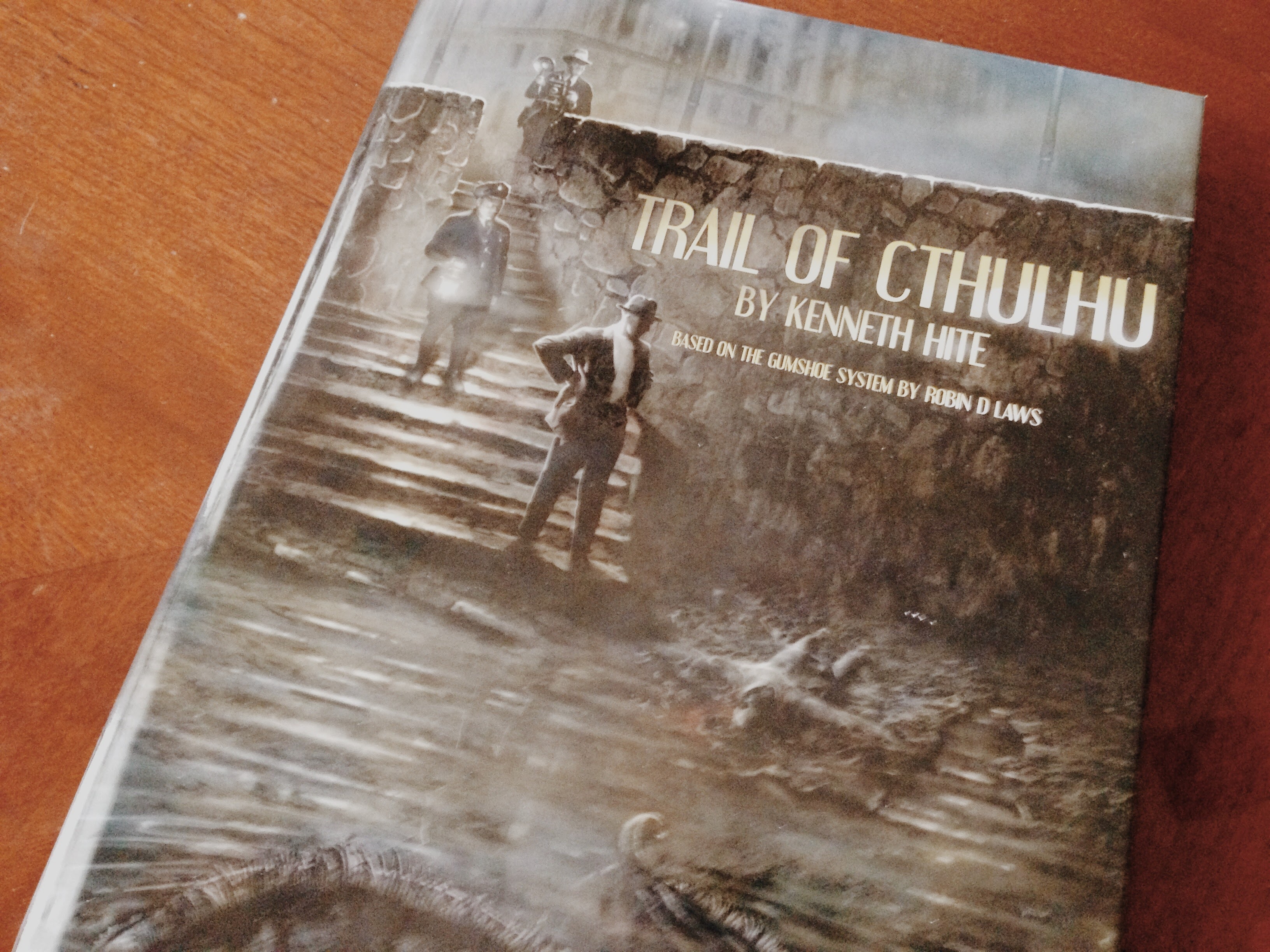

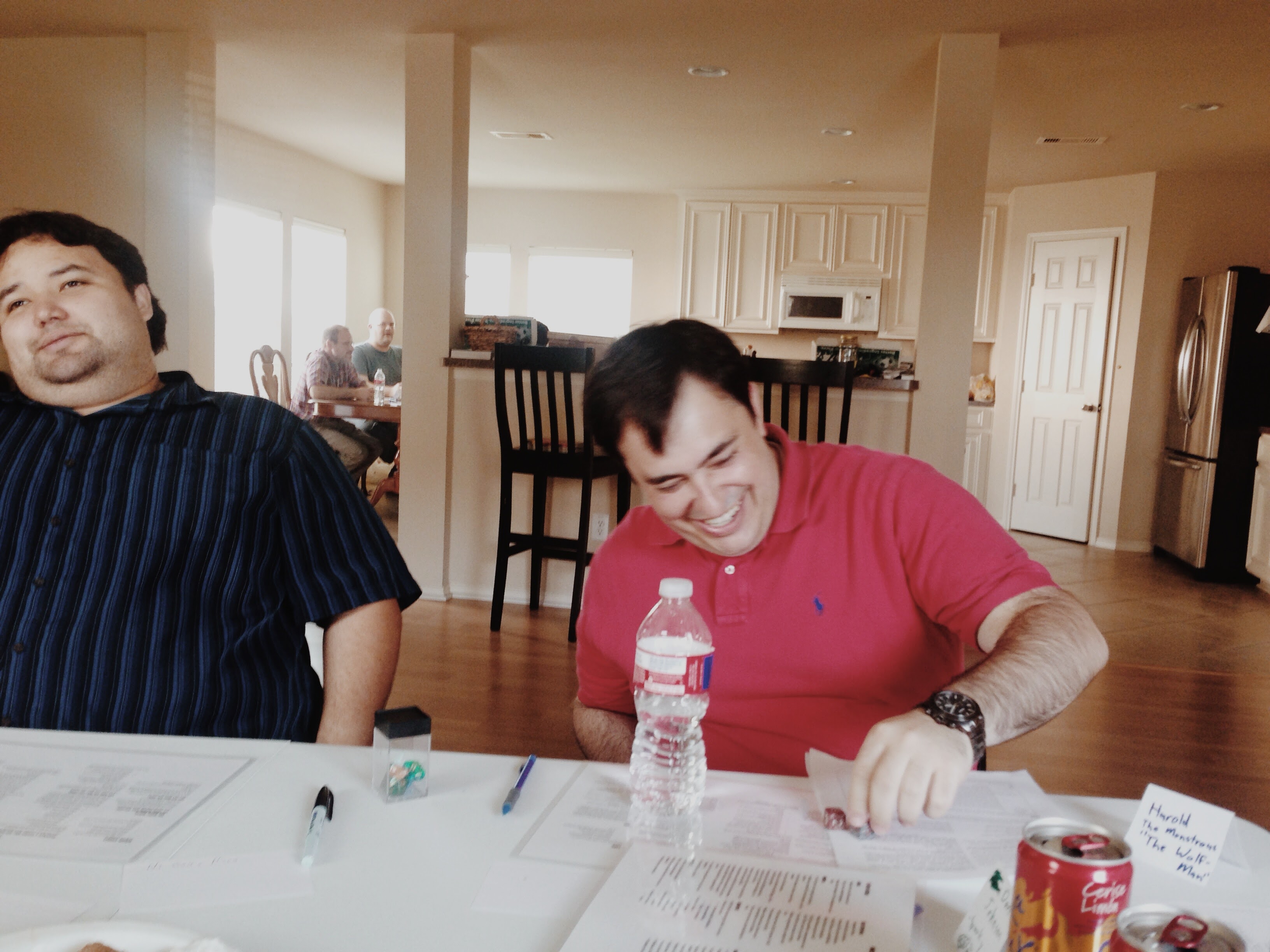
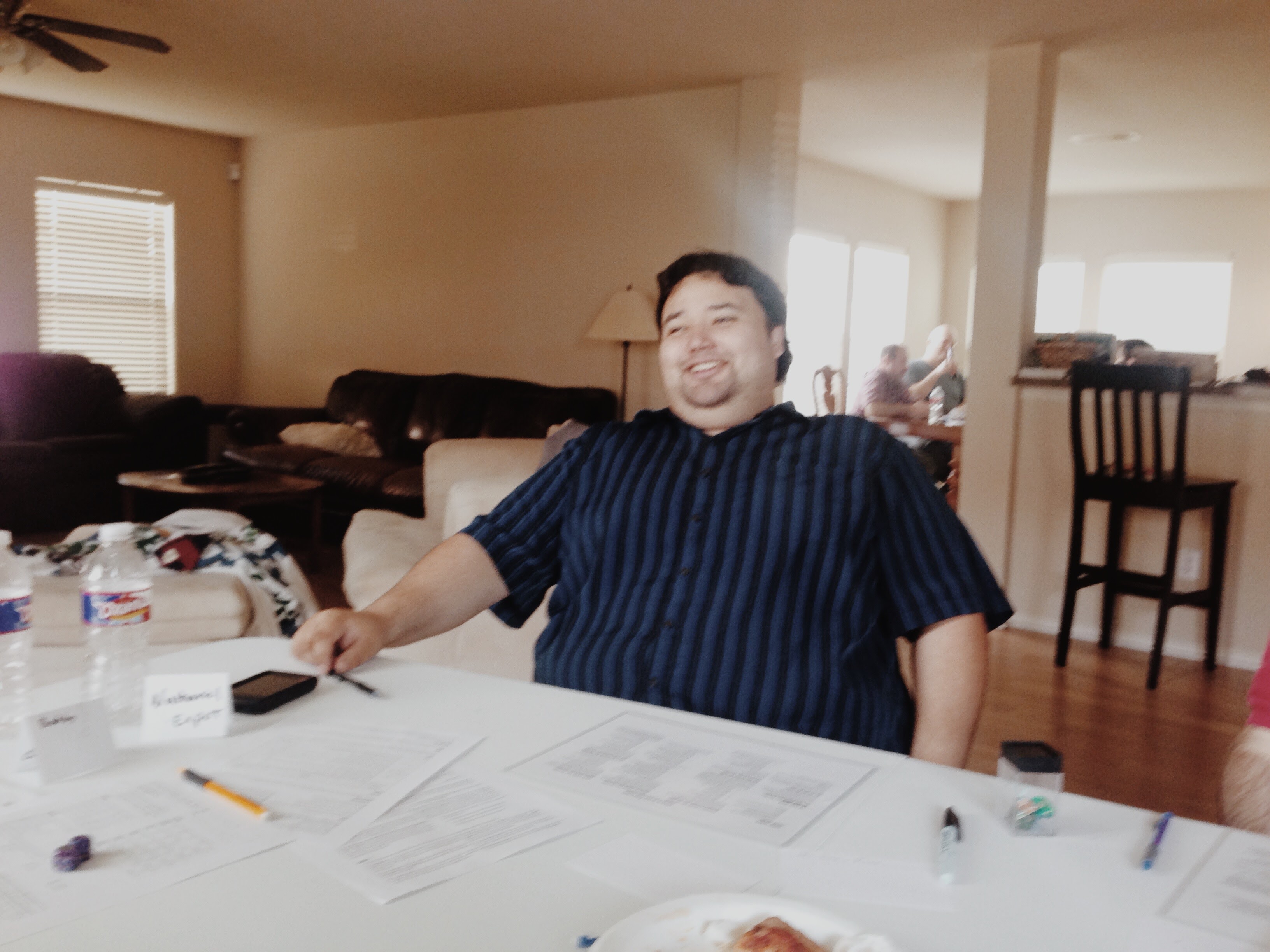

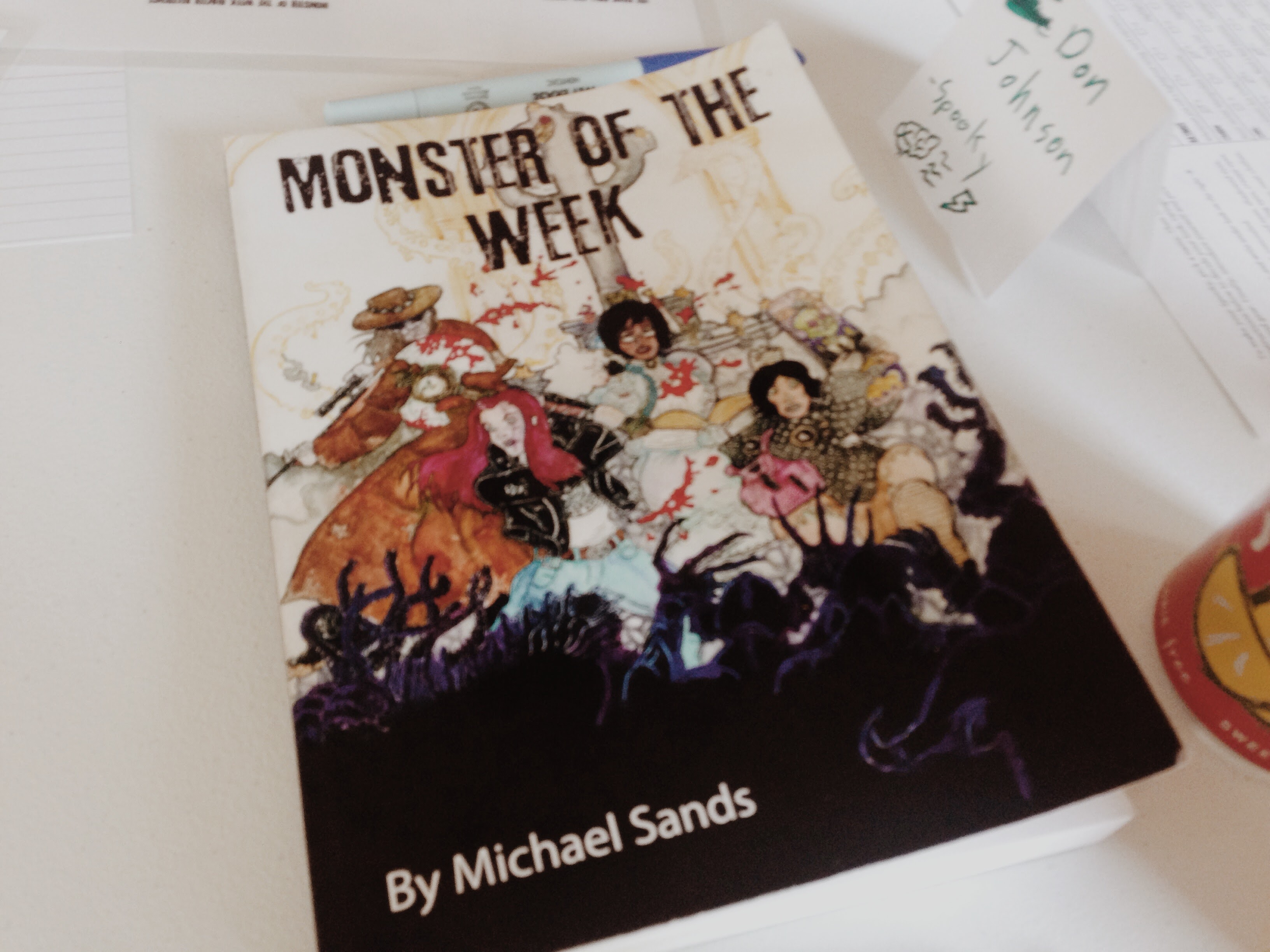
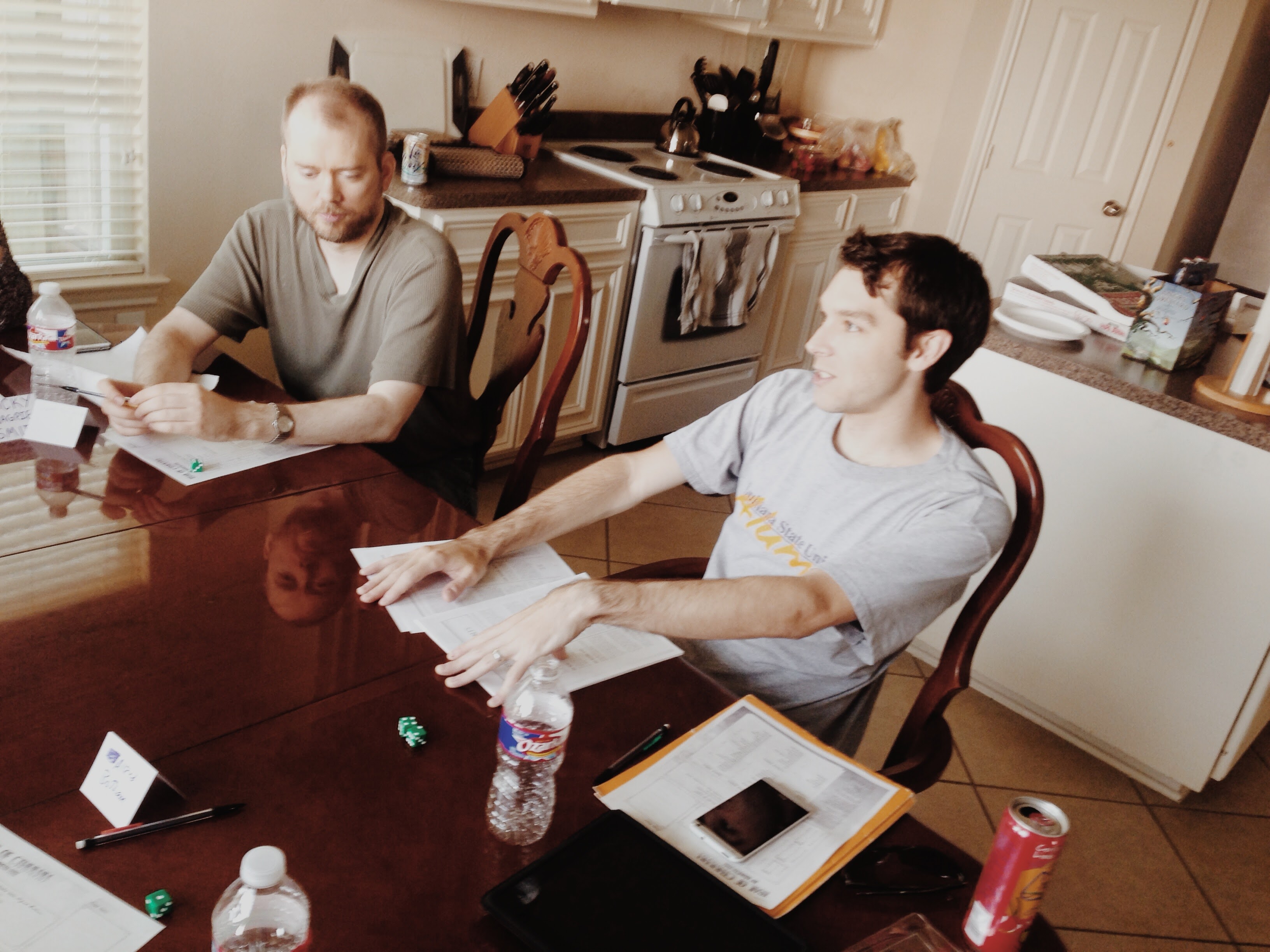
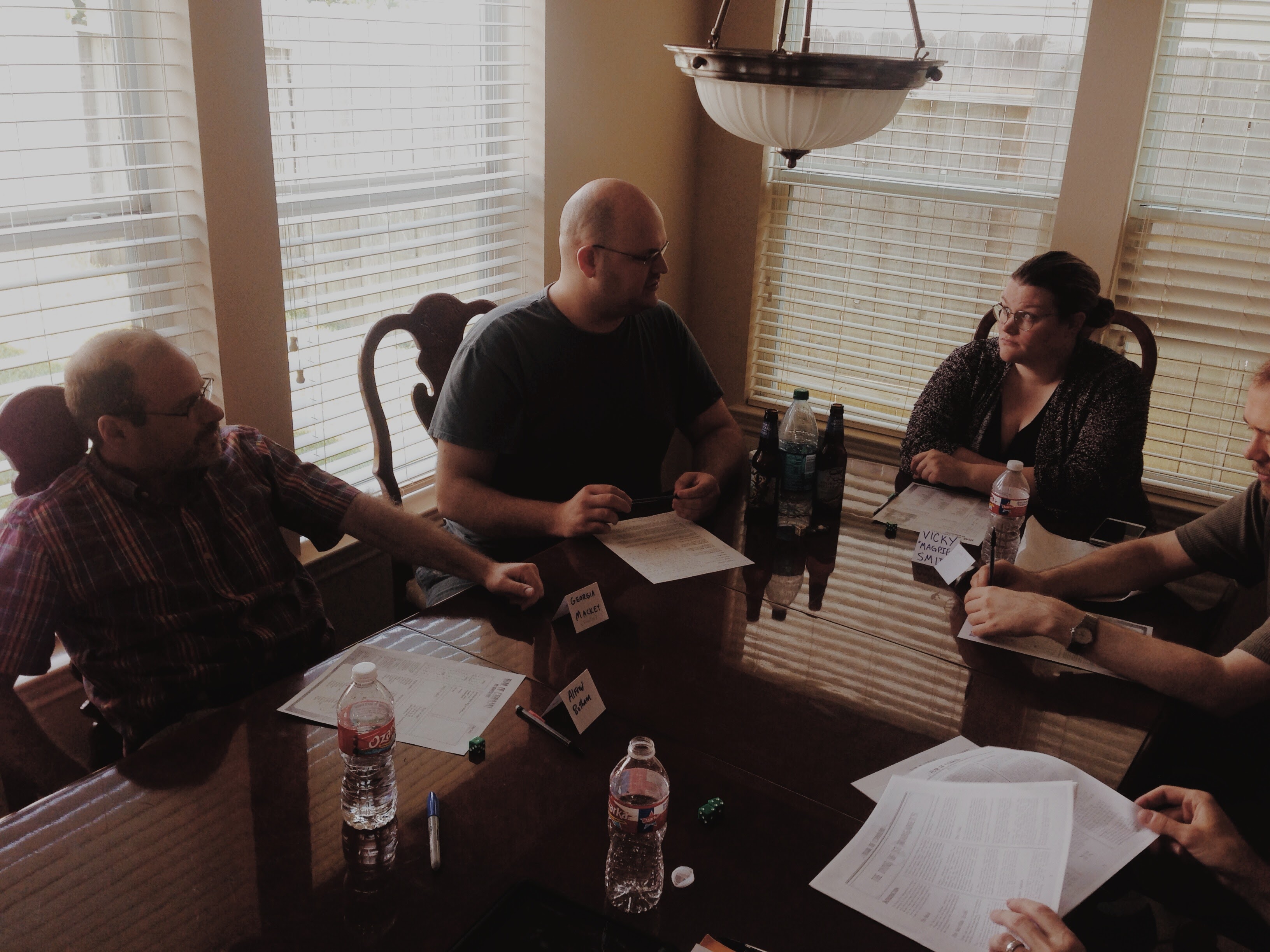
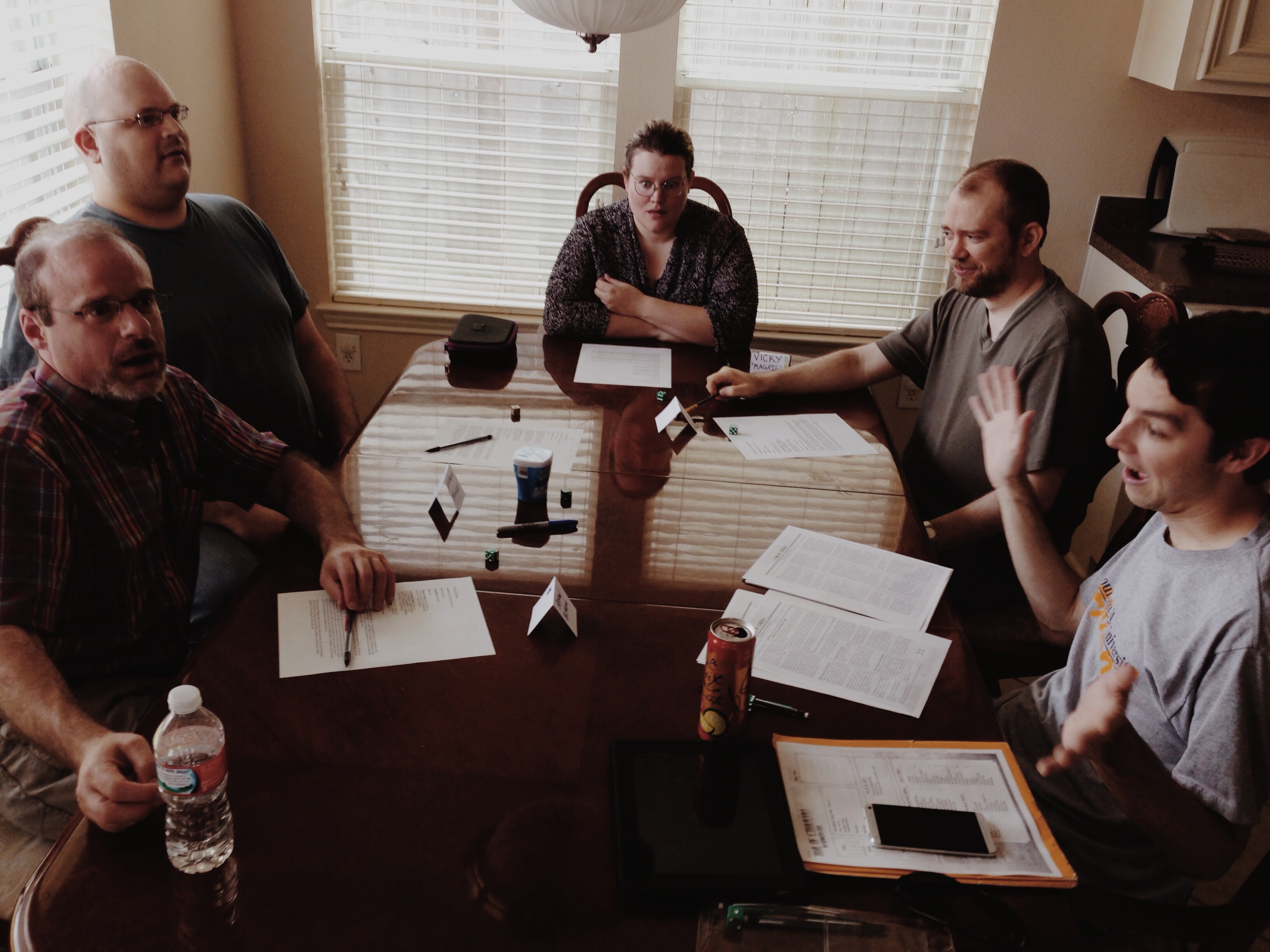
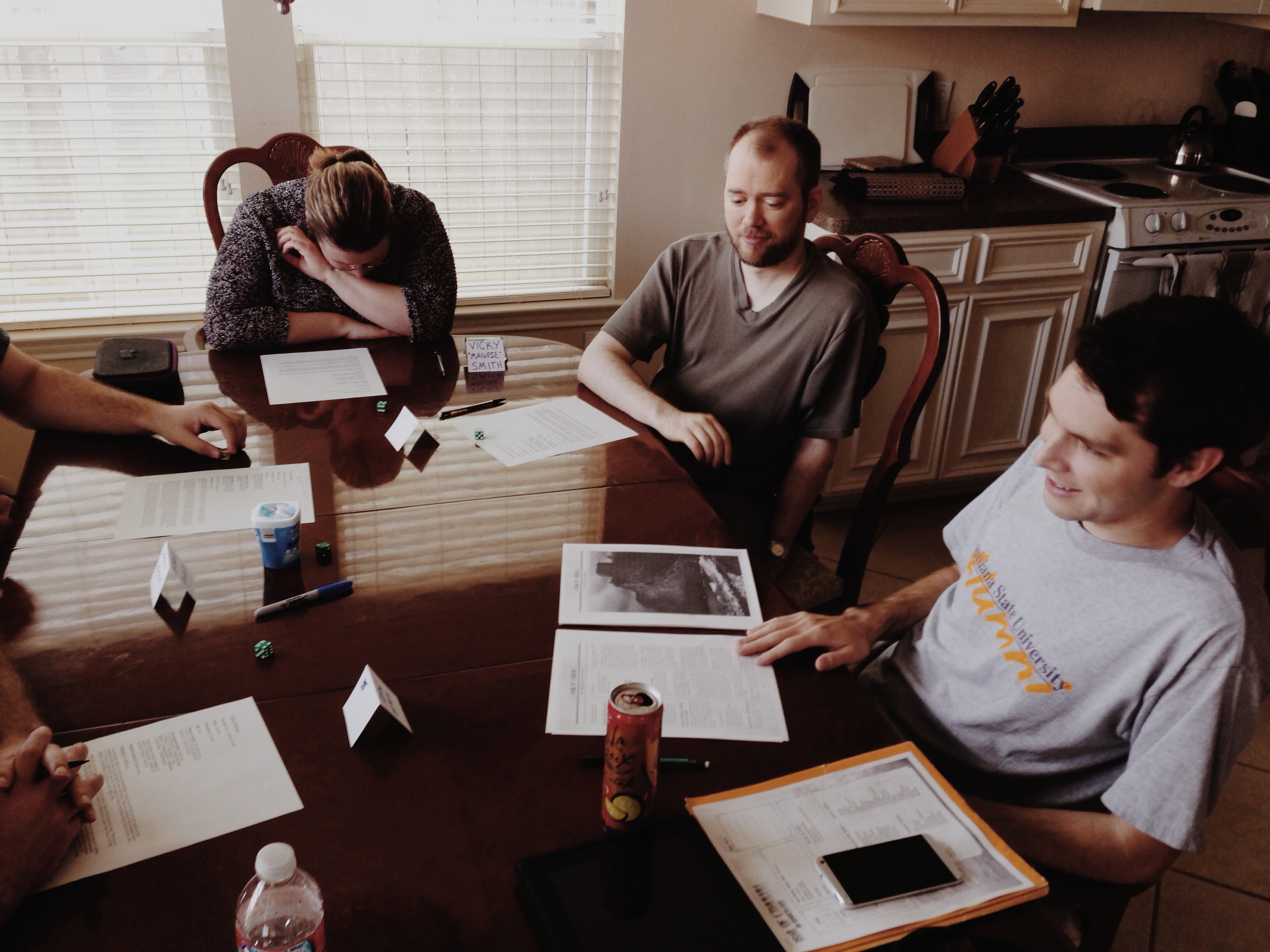

Internet high five to whoever was playing a character named “Don Johnson” in the MotW game.
Internet high five to whoever was playing a character named “Don Johnson” in the MotW game.
So, GUMSHOE…
I’m coming out of this game with lower opinions of the system than I had after my only previous experience with GUMSHOE, Fear Itself. After running Fear Itself, I thought that the investigation mechanics worked well, but the combat/skill challenges weren’t great. For this game, I ran a “purist” adventure, so there was nothing but investigation. I figured that if that was the part of the system that worked well, just focusing on that should make for a great game. Not so much.
It turns out that the big advantage of GUMSHOE, that the players can’t miss important clues as long as they are in the right place and have the right skill, means there’s not much for the players to do but ride the railroad while the GM parades NPCs in front of them and drops clues.
You can see it baked into the character design. For example, each character has a drive that basically serves as a stick that the GM can hit them with if they try to get off the rails.
“Don’t want to go into the dark cave full of eldritch horrors? Too bad, your character craves ‘adventure’, so into the cave you go!”
I could go on and on but I think that it really comes down to the fact that this game is very much in the old-school mindset where the GM is there to deliver the story and the players are there to passively receive it. I would rather play a game where the GM and players create a story together than one where the players are just there to act out a play that the GM has the script to.
That said, I still want to try Night’s Black Agents…
So, GUMSHOE…
I’m coming out of this game with lower opinions of the system than I had after my only previous experience with GUMSHOE, Fear Itself. After running Fear Itself, I thought that the investigation mechanics worked well, but the combat/skill challenges weren’t great. For this game, I ran a “purist” adventure, so there was nothing but investigation. I figured that if that was the part of the system that worked well, just focusing on that should make for a great game. Not so much.
It turns out that the big advantage of GUMSHOE, that the players can’t miss important clues as long as they are in the right place and have the right skill, means there’s not much for the players to do but ride the railroad while the GM parades NPCs in front of them and drops clues.
You can see it baked into the character design. For example, each character has a drive that basically serves as a stick that the GM can hit them with if they try to get off the rails.
“Don’t want to go into the dark cave full of eldritch horrors? Too bad, your character craves ‘adventure’, so into the cave you go!”
I could go on and on but I think that it really comes down to the fact that this game is very much in the old-school mindset where the GM is there to deliver the story and the players are there to passively receive it. I would rather play a game where the GM and players create a story together than one where the players are just there to act out a play that the GM has the script to.
That said, I still want to try Night’s Black Agents…
Unfortunately, that’s pretty much my take as well. It’s all sort of right there in the name, too. The Trail of Cthulhu. The book talks about the clue trail, about getting PCs to “the next scene,” and so on. My optimism was largely unfounded, but it’s still a bummer to be let down.
Also, I really don’t like the way investigative abilities work. It’s extremely up for interpretation what constitutes a core clue and what would require a spend, unless you’ve got a scenario dictating precisely what’s what. Not a big fan of the amount of handwavium required to dole out clues. The dividing line between investigative and general abilities is pretty hazy in practice, too.
I still might give it another shot. The scenario seemed a bit lackluster. Things may have been cut short a bit by us having to fit it all into one session, but it did seem to jump very quickly from “fledgling investigation” to “elder thing insta-death.”
Now I just hold out hope for Cthulhu Dark and maybe one of the AW hacks.
Unfortunately, that’s pretty much my take as well. It’s all sort of right there in the name, too. The Trail of Cthulhu. The book talks about the clue trail, about getting PCs to “the next scene,” and so on. My optimism was largely unfounded, but it’s still a bummer to be let down.
Also, I really don’t like the way investigative abilities work. It’s extremely up for interpretation what constitutes a core clue and what would require a spend, unless you’ve got a scenario dictating precisely what’s what. Not a big fan of the amount of handwavium required to dole out clues. The dividing line between investigative and general abilities is pretty hazy in practice, too.
I still might give it another shot. The scenario seemed a bit lackluster. Things may have been cut short a bit by us having to fit it all into one session, but it did seem to jump very quickly from “fledgling investigation” to “elder thing insta-death.”
Now I just hold out hope for Cthulhu Dark and maybe one of the AW hacks.
Steve Mains The pacing was definitely a little weird on that scenario. I think that since they were using such a well-known monster, they tried to keep things way too subtle leading up to the big reveal.
I was also kind of flying through the end, though. The last cave was supposed to take ~45 minutes and we probably did it in ~15. I’m not sure how it’s supposed to take that long though, since there was literally one skill check for the players to do from the entrance of the cave to the end of the scenario. I guess I was supposed to take another half–hour to layer on a lot of scary descriptions, but honestly, how long can you talk about a cave with a couple of dead bodies in it?
Steve Mains The pacing was definitely a little weird on that scenario. I think that since they were using such a well-known monster, they tried to keep things way too subtle leading up to the big reveal.
I was also kind of flying through the end, though. The last cave was supposed to take ~45 minutes and we probably did it in ~15. I’m not sure how it’s supposed to take that long though, since there was literally one skill check for the players to do from the entrance of the cave to the end of the scenario. I guess I was supposed to take another half–hour to layer on a lot of scary descriptions, but honestly, how long can you talk about a cave with a couple of dead bodies in it?
Oh! While we’re at it, what the heck was that machine? And could we have figured out what we were up against without just doing what we did and going to the cave(s)?
Oh! While we’re at it, what the heck was that machine? And could we have figured out what we were up against without just doing what we did and going to the cave(s)?
The Perfect Investigation Game is one of those Holy Grail things in tabletop RPGs. Kind of like The Superhero Game That Doesn’t Completely Suck. While there might be some games that are close to getting it right (Technoir, maybe?), it might be worth reframing the conversation altogether. It could simply be that the genre, as it is traditionally implemented, is not very fun as a tabletop RPG. It’s a lot of goddamn work for the GM and, as discussed above, railroading seems to be an issue.
It’s funny that we also played MotW yesterday, because it is a game we have, in the past, accused of being bad at investigation. But as I have gotten better at PbtA, I have come around to the idea that we were wrong about that. The key is that it’s important to re-think what an investigation game is. In MotW (and I hope tremulus) when the players succeed on their investigation move, you simply give them the answer to their question but then you ask them “How did you find that out?” That is a very important part of the process, and it solves a couple of things: 1) the GM doesn’t have to come up with an elaborate prep (“This clue is Location A and this clue is in Location B” and so forth) and 2) it lets the players solve things in a way they find satisfying for their character, which helps avoid the rail-roady feeling. I suppose it’s more freeform than what many people are comfortable with, and it’s hardly a traditional approach, but I can tell you it leads to more satisfying outcomes at the table, and that seems more important to me than obeying these old notions of what it means to investigate things in an RPG.
The Perfect Investigation Game is one of those Holy Grail things in tabletop RPGs. Kind of like The Superhero Game That Doesn’t Completely Suck. While there might be some games that are close to getting it right (Technoir, maybe?), it might be worth reframing the conversation altogether. It could simply be that the genre, as it is traditionally implemented, is not very fun as a tabletop RPG. It’s a lot of goddamn work for the GM and, as discussed above, railroading seems to be an issue.
It’s funny that we also played MotW yesterday, because it is a game we have, in the past, accused of being bad at investigation. But as I have gotten better at PbtA, I have come around to the idea that we were wrong about that. The key is that it’s important to re-think what an investigation game is. In MotW (and I hope tremulus) when the players succeed on their investigation move, you simply give them the answer to their question but then you ask them “How did you find that out?” That is a very important part of the process, and it solves a couple of things: 1) the GM doesn’t have to come up with an elaborate prep (“This clue is Location A and this clue is in Location B” and so forth) and 2) it lets the players solve things in a way they find satisfying for their character, which helps avoid the rail-roady feeling. I suppose it’s more freeform than what many people are comfortable with, and it’s hardly a traditional approach, but I can tell you it leads to more satisfying outcomes at the table, and that seems more important to me than obeying these old notions of what it means to investigate things in an RPG.
The machine was pretty much just a red herring. Same thing with the sick kids’ medicine. There wasn’t really any way to figure out what was going on other than what you guys did.
I think it’s fairly telling that the two scenes that seemed to be the most engaging were the ones that were of absolutely no consequence to the larger story.
The machine was pretty much just a red herring. Same thing with the sick kids’ medicine. There wasn’t really any way to figure out what was going on other than what you guys did.
I think it’s fairly telling that the two scenes that seemed to be the most engaging were the ones that were of absolutely no consequence to the larger story.
Yeah. Those herrings, they were awwwwfully red.
Yeah. Those herrings, they were awwwwfully red.
Jason Cordova I’ve more or less come to the same conclusion. My initial good vibes from GUMSHOE were “investigation doesn’t actively suck the fun out of the game”, but there’s a big difference between a mechanic not making a game worse and actually being good in its own right.
I need to play in another one of your MotW games, because where I’m at now is basically thinking that the act of investigation itself just isn’t fun. The old “blow the roll don’t get the clue” system is definitely the worst. GUMSHOE’s auto clue acquisition system fixes that but what it leaves you with is barely a game. The only real advantage I see to a PbtA system is that missing an investigation roll can lead to interesting situations, but it seems like success is probably still not all that exciting.
I’m not convinced that it will ever be satisfying to roleplay looking up information in the library, which is why I was so happy with Technoir completely ditching the whole idea of non-confrontational investigation and making clue gathering a matter of finding people who were better informed than you and making them talk.
Jason Cordova I’ve more or less come to the same conclusion. My initial good vibes from GUMSHOE were “investigation doesn’t actively suck the fun out of the game”, but there’s a big difference between a mechanic not making a game worse and actually being good in its own right.
I need to play in another one of your MotW games, because where I’m at now is basically thinking that the act of investigation itself just isn’t fun. The old “blow the roll don’t get the clue” system is definitely the worst. GUMSHOE’s auto clue acquisition system fixes that but what it leaves you with is barely a game. The only real advantage I see to a PbtA system is that missing an investigation roll can lead to interesting situations, but it seems like success is probably still not all that exciting.
I’m not convinced that it will ever be satisfying to roleplay looking up information in the library, which is why I was so happy with Technoir completely ditching the whole idea of non-confrontational investigation and making clue gathering a matter of finding people who were better informed than you and making them talk.